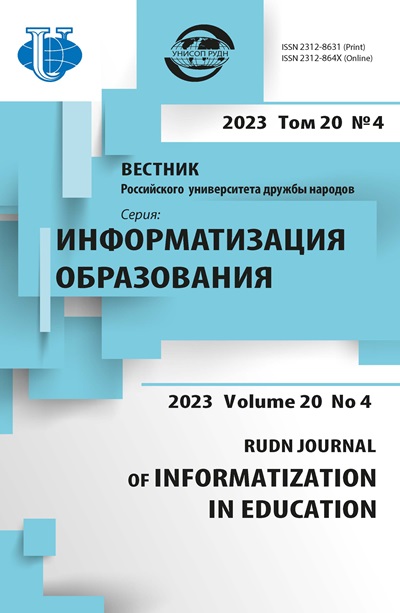Issue
Title
Authors
|
Senashenko D.V., Yurkov A.V. |
|
Sadovnichy U.V., Turkmenov R.M. |
|
Grigorev S.G., Grinshkun V.V., Lvova O.V., Shunina L.A. |
|
Ibragimova N.Z., Tuyakbayeva G.A. |
|
Kolbasova T.G., Pavlenko L.G. |
|
Beloglazova L.B., Bondareva O.V. |
|
Zaharov A.S. |
|
Kartashova L.I., Levchenko I.V. |
|
Sviridov M.S. |
|
Kartashova L.I., Levchenko I.V., Pavlova A.E. |
|
Silchenko A.P. |
|
Karakozov S.D., Manyakhina V.G. |
|
Levchenko I.V. |
|
Klyuchnikova O.V. |
|
Aslanov R.M., Ignatova O.G., Nizhnikov A.I. |
|
Beljaev M.I. |
|
Dudysheva E.V., Solnyshkova O.V. |
|
Glizburg V.I. |
|
Kornilov V.S. |
|
Kornilov V.S. |
|
Krasnova G.A., Nuhuly A., Teslenko V.A. |
|
Beloglazov A.A., Beloglazova L.B. |
|
Egorova M.A. |
|
Zaslavskaya O.Y. |
|
Detusheva L.V., Dobritsa V.P. |
|
Kornilov V.S. |
|
Karyakin M.I., Sokolova M.A., Khatlamadzhian P.A., Shutko V.M. |
|
Bogun V.V. |
|
Remorenko I.M. |
|
Lozhakova E.A. |
|
Rybakov D.S., Rusinov A.S. |
|
Dmitriev V.M., Dmitriev I.V. |
|
Gasparian A.A. |
|
Prusakova O.A. |
|
Grigoryev S.G., Grinshkun V.V., Lvova O.V. |
|
Kartashova L.I. |
|
Glizburg V.I. |
|
Philippov S.A., Komelina E.V. |
|
Junov S.V., Feshina E.V. |
|
Lopatin E.A., Shkabin G.S. |
|
Kornilov V.S. |
|
Kusakina E.V., Samarina E.A., Frolov Y.V. |
|
Matukhin P.G., Provotorova E.A., Gracheva O.A., Komissarova N.V., Rybakova I.V. |
|
Moiseev V.P., Selezneva N.N. |
|
Kornilov V.S. |
|
Kornilov V.S. |
|
Kornilov V.S. |
|
Polushkina E.A., Krasnova G.A. |
|
Bidaybekov E.Y., Kornilov V.S., Kamalova G.B., Akimzhan N.S. |
|
Gracheva O.A., Matukhin P.G., Elsgolts S.L. |
|
Davletkeldieva A.A., Provotorova E.A., Matukhin P.G., Vyalova T.K. |
|
Khozyainova M.S. |
|
Dimov E.D. |
|
Sarykov E.S. |
|
Kudinov V.A. |
|
Kartashova L.I. |
|
Bidaybekov E.Y., Kulbekov M.K., Ospanbekov E.A., Erzhenbek B., Hamraev S.I. |
|
Panyukova S.V., Prusakova O.A. |
|
Khozhaeva T.S. |
|
Trofimets E.N. |
|
Kartashova L.I. |
|
Petrushova M.V. |
|
Grigoreva K.S. |
|
Rusinov A.S. |
|
Asaulenko E.V. |
|
Galchuk L.M. |
|
Khudolei N.V. |
|
Ionkina N.A. |
|
Bubnov V.A., Sadykova A.R. |
|
Senashenko D.V., Senashenko M.D. |
|
Gerbekov H.A., Kubekova B.S., Chankayeva N.M. |
|
Krasnova G.A. |
|
Tomashevskaya V.S., Rogov I.E., Starichkova J.V., Karachunsky A.I., Rumyantsev S.A. |
|
Chayka L.V. |
|
Yakurnova A.V. |
|
Klekovkin G.A., Orlova N.N. |
|
Bocharov M.I. |
|
Lapchik M.P. |
|
Rybakov D.S. |
|
Zaslavskaya O.Y., Kravets O.J. |
|
Simonova I.V., Bocharov M.I. |
|
Levchenko I.V. |
|
Snegurova V.I. |
|
Constantinian T.K. |
|
Zaslavskaya O.Y., Filatova N.I. |
|
Chernyshov M.Y. |
|
Krivolapov S.V. |
|
Kornilov V.S. |
|
Zaslavskaya O.Y., Levchenko M.S. |
|
Kornilov V.S. |
|
Kornilov V.S. |
|
Kornilov V.S. |
|
Kartashova L.I., Levchenko I.V., Pavlova A.E. |
|
Duiseyeva G.O., Berkimbaev K.M. |
|
Kartashova L.I., Levchenko I.V., Pavlova A.E. |
|
Krasnova A.A. |
|
Belyaeva E.V. |
|
Kartashova L.I., Levchenko I.V., Pavlova A.E. |
|
Khadiullina R.R., Chinkin A.S. |
|
Istomin I.P. |












